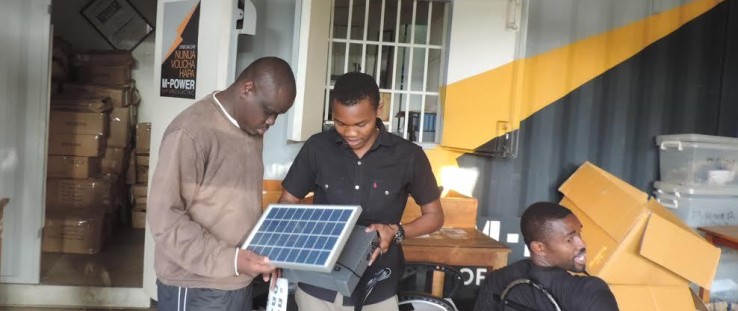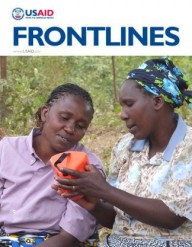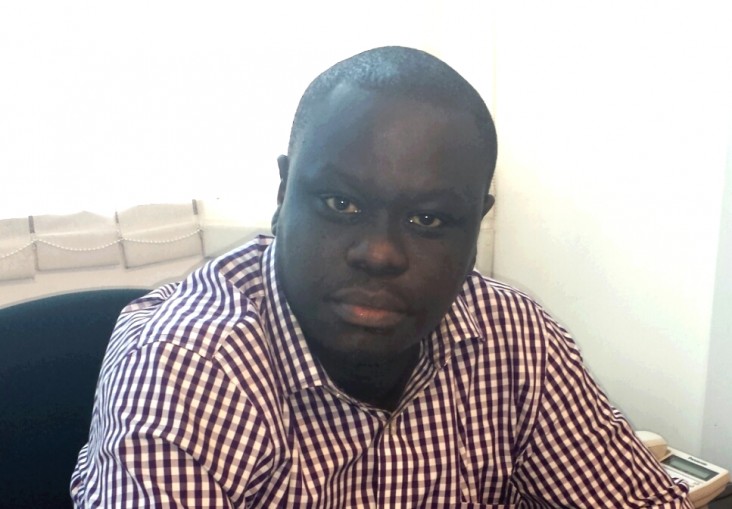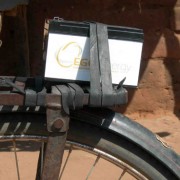 Steve Wasira, left, visits Off Grid Electric, a partner of the Power Africa sub-initiative, Beyond the Grid. Off Grid Electric provides solar energy services through its M-Power energy hubs in Arusha, Tanzania, and is expanding to Mwanza.
Steve Wasira, left, visits Off Grid Electric, a partner of the Power Africa sub-initiative, Beyond the Grid. Off Grid Electric provides solar energy services through its M-Power energy hubs in Arusha, Tanzania, and is expanding to Mwanza.
 Steve Wasira, left, visits Off Grid Electric, a partner of the Power Africa sub-initiative, Beyond the Grid. Off Grid Electric provides solar energy services through its M-Power energy hubs in Arusha, Tanzania, and is expanding to Mwanza.
Steve Wasira, left, visits Off Grid Electric, a partner of the Power Africa sub-initiative, Beyond the Grid. Off Grid Electric provides solar energy services through its M-Power energy hubs in Arusha, Tanzania, and is expanding to Mwanza.
Call it luck or call it coincidence, but I happened to be in my home country of Tanzania when President Barack Obama visited in July 2013. “I need to get home quick,” I implored my cab driver. I didn’t want to miss the president live on television.
On the live broadcast, I heard the president talk about the need for a new energy partnership between the United States and Africa. After living in New York City for the past seven years working on energy projects across the continent, the president’s call inspired me to return to my home country later that year to continue working on energy issues alongside my fellow Tanzanians. In some ways, it seemed the president was thinking of people just like me, who were born in Africa but fortunate enough to experience the wonderful educational and professional opportunities that America has to offer.
Tanzania has a low electrification rate. Currently, the country connection rate is 24 percent, of which only about 7 percent is in rural areas. This low connectivity rate forces many households to rely on other, more expensive forms of energy, including firewood, kerosene and candles. In an effort to support Tanzania’s energy sector, Power Africa aligned itself with the Tanzanian Government’s Big Results Now Initiative for 2016, which is initiating several steps to improve electricity access, strengthen the financial capacity of the public utility TANESCO, and develop mini and off-grid renewable opportunities to increase rural electrification access. This increase continues to open up opportunities for communities by employing energy technologies that save time and labor. These savings are projected to accelerate socioeconomic development activities such as powering schools and health centers, and running irrigation pumps and grain mills.
As a transaction adviser working for TetraTech, a U.S. consulting, engineering and technical services firm involved with Power Africa, I have been fortunate enough to be able to contribute to the initiative. I work with the Tanzanian Government on issues ranging from reforming policy to developing technical capability to helping to address project financing needs.
Power Africa’s other transaction advisers and I all strive to further President Obama’s goal to dramatically increase the number of people who have access to electricity in sub-Saharan Africa. But this goal will not be easy, certainly not in Tanzania; my native country faces challenges in its energy sector.
Since I started working with project developers in advancing rural energy development in mid-October 2013, I have seen two main challenges which must be overcome in order for Tanzania to move forward to meet its long-term energy needs. First, local developers must be able to find the necessary financing for power projects. Second, the Tanzanian Government, the U.S. Government and other Power Africa partners, such as the African Development Bank and World Bank, must all continue to work together to increase the number of capable developers available for these proposed projects.
Progress will come step by step here in Tanzania, and that is to be expected and welcomed. In part due to Power Africa’s work, a 10-megawatt small hydro power project, developed by local company EA Power and located on the Kiwira River in southern Tanzania, has now proceeded to sign an advisory and arranging mandate agreement for financing with the Stanbic Bank, part of the Standard Bank Group. This is one of the many projects I continue to support.
The ultimate goal is to have a bankable business plan, enabling projects to be presented to lenders and obtain financing. The aforementioned Kiwira River small hydro project and many others that we work on would provide much needed electricity to communities, especially in rural areas.
This is a time of great excitement for the Power Africa initiative. I do miss living in Brooklyn, but being here allows me to work more closely in making my home country a better place to live, so that Tanzanians can someday have some of the same opportunities I was fortunate enough to have in the United States. There is a certain buzz associated with Power Africa in Tanzania. People are heavily interested in this initiative, perhaps most of all my mother, who lives in Dar es Salaam and likes to tell her friends how proud she is of her son coming home to support development efforts in his country.
A version of this article first appeared in the Power Africa July 2014 newsletter.












Comment
Make a general inquiry or suggest an improvement.